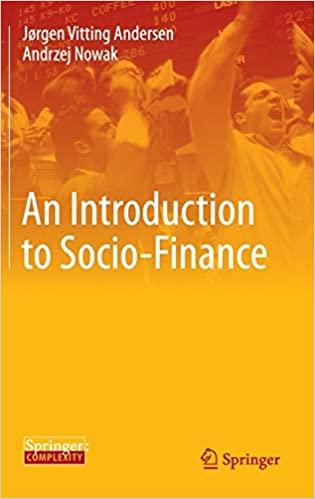Question
The put option of Joe Inc. is currently trading at $2.50 while the call option premium is $7.50. Both the put and the call have
The put option of Joe Inc. is currently trading at $2.50 while the call option premium is $7.50. Both the put and the call have an exercise price of $25. Joe Inc. stock is currently trading at $32.25 and the risk free rate is 3%. The options will expire in one month. I. An investor applies a protective put strategy by buying the put option of Joe Inc. to protect his holding of the companys stock. This strategy creates a portfolio of long stock and long put, which provides a payoff of unlimited upside potential with a limited loss. This is similar to buying a call option (i.e., a long call position) of Joe Inc. that also provides unlimited upside profit potential with a limited loss (the maximum loss will be the option premium paid). Investigate the profit/loss possibilities at options expiration for the protective put portfolio vs. the long call position. For example, if the stock price is $14 when options expire, stocks profit/loss will be $l4 - $32.25 = - $18.25 (i.e., a loss), long put options profit/loss will be $25 - $14 - $2.5 = $8.5 (i.e., a profit), and long call options profit/loss will be $0 - $7.5 = - $7.5 (i.e., a loss). Thus, a protective-put portfolio of long stock and long put will incur portfolios profit/loss of - $18.25 + $8.5 = - $9.75, while the long call position will suffer - $7.5 loss. These profits/losses are entered in the following table for the Stock Price = 14.00. Complete the following table for different stock prices other than $14. (In this exercise, ignore the interest costs on capital.)
| Stock Price When Options Expire | Without Considering Interest Costs | |||
| Protective-Put Portfolio | Long Call | |||
| $ | (Profit/Loss) | Call Option Profit/Loss (4) | ||
| Stock Profit/Loss (1) | Put Option Profit/Loss (2) | Portfolio Profit/Loss (3) = (1) + (2) | ||
| 14.00 | -18.25 | 8.50 | -18.25 + 8.5 = -9.75 | 0 -7.5 = -7.50 |
| 17.10 | -15.15 | 5.4 | -15.15 + 5.4 = -9.75 | 0 -7.5 = -7.50 |
| 20.30 | -11.95 | 2.2 | -11.95 + 2.2 = -9.75 | 0 -7.5 = -7.50 |
| 23.50 | -8.75 | -1 | -8.75 + - 1 = -9.75 | 0 -7.5 = -7.50 |
| 25.00 (strike) | -7.25 | -2.5 | -7.25 + - 2.50 = -9.75 | 0 -7.5 = -7.50 |
| 26.70 | -5.55 | -4.2 | -5.55 + - 4.20 = -9.75 | 0 -7.5 = -7.50 |
| 29.90 | -2.35 | -7.4 | -2.35 + - 7.40 = -9.75 | 0 -7.5 = -7.50 |
| 32.50 | 0.25 | -10 | .25 + - 10.40 = -9.75 | 0 -7.5 = -7.50 |
| 35.70 | 3.45 | -13.2 | 3.45 + - 13.20 = -9.75 | 0 -7.5 = -7.50 |
| 38.90 | 6.65 | -16.4 | 6.65 + - 16.40 = -9.75 | 0 -7.5 = -7.50 |
| 42.00 | 9.75 | -19.5 | 9.75 + - 19.50 = -9.75 | 0 -7.5 = -7.50 |
| Long stock | Long Put Options | Protective Put Portfolio of | Long Call Position/Options | |
| Long stock &Long call(Strategy) | ||||
1. What is the maximum loss for the protective put strategy (i.e., holding a portfolio of long stock and long put)? Also, what is the maximum loss for the long call?
2. What is the difference in payoff between the protective put strategy and the long call for each of the possible stock prices at options expiration?
Step by Step Solution
There are 3 Steps involved in it
Step: 1

Get Instant Access to Expert-Tailored Solutions
See step-by-step solutions with expert insights and AI powered tools for academic success
Step: 2

Step: 3

Ace Your Homework with AI
Get the answers you need in no time with our AI-driven, step-by-step assistance
Get Started


